GIST CATALYST Celebrates the Next Generation of Women-Led Innovation
The future arrived in Bangkok- Learn more about this extraordinary event!
A New Kind of Pitch Competition is Born in Bangkok
This November was an extraordinary time for the GIST Initiative–we are proud to share the successes of our latest event, one of our most exciting and inspiring ever! GIST CATALYST: ASIA PACIFIC was the latest iteration of the CATALYST Program, our unique global pitch competition. Building on our legacy of constant iteration and development, we worked to build a version of the program that would reach new heights. Following our first ever virtual competition during the COVID-19 pandemic, we were excited to develop a program that would take full advantage of the return to in-person programming. The U.S. Department of State’s GIST Initiative is proud to have launched this program in Bangkok to highlight women innovators in the global APEC region at a time of increased renewal and energy for the future. The program celebrates and uplifts these 16 innovators who each offered an extraordinary vision for the future of innovation and the key role women in the Global Pacific will play in it. With over $70k in non-dilutive startup capital on the line and an extraordinary opportunity to be in Bangkok with global political and business leadership, this event was sure to be like no other!
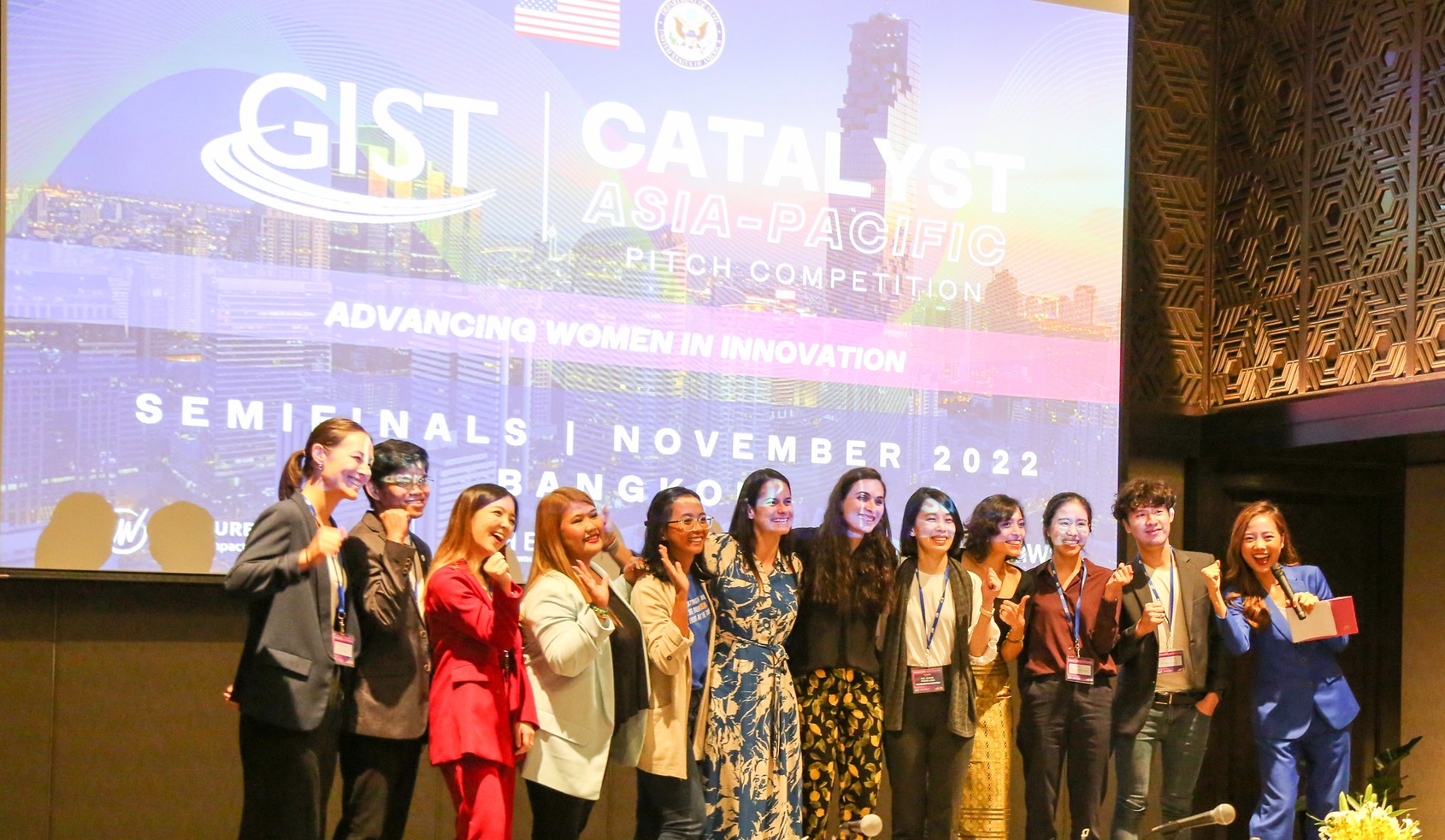
What do tomorrow’s innovation leaders need to know?
GIST CATALYST trainings are here to help answer that question.
First and foremost, CATALYST is a pitch competition. But what makes CATALYST unique is the focus on training that occurs before the competition aspect gets started. Bright and early on the 14th, sixteen women-focused innovators began their first day of business model and pitch training in Bangkok. Over the course of the day, venture development experts Rhonda Shrader and Nakia Melecio conducted a series of workshops designed to help these founders gain the tools they need to take their ventures to the next level. Ms. Shrader started the day off, bringing one-of-a-kind energy and vision to help these entrepreneurs navigate LEAN startup methodology, diving deep into central tenets like customer discovery and product validation. Over the course of the workshop, founders shared their unique stories and journeys, learning from one another and deepening networks and connections. In the process they developed not only their pitches but their whole approach to charting the course of their venture. Rhonda Shrader described her experience working with these brilliant founders:
“I’m awed by the quality and range of problems being solved by this year’s Catalyst companies. The founders are smart and eager to apply what they’re learning in sessions, and keen to engage with the group to share their learnings and experiences.”
In the afternoon, venture development expert Nakia Melecio built on these learnings and led the group through a series of workshops and training modules focused on topics of paramount importance to founders working in innovation–concepts like understanding value chains and delivering that value to clients, investors and customers.
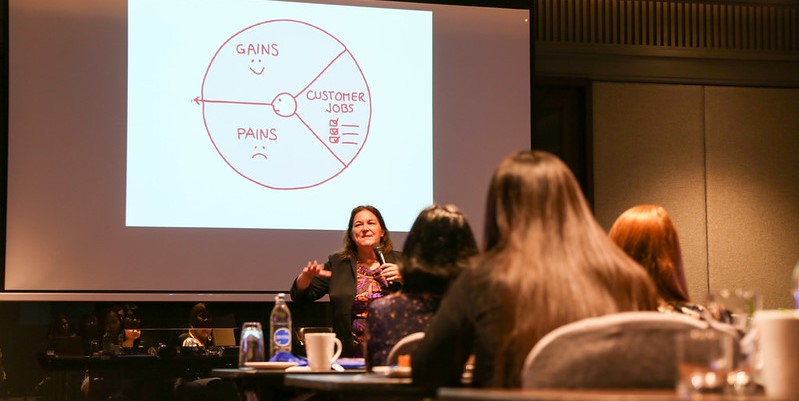
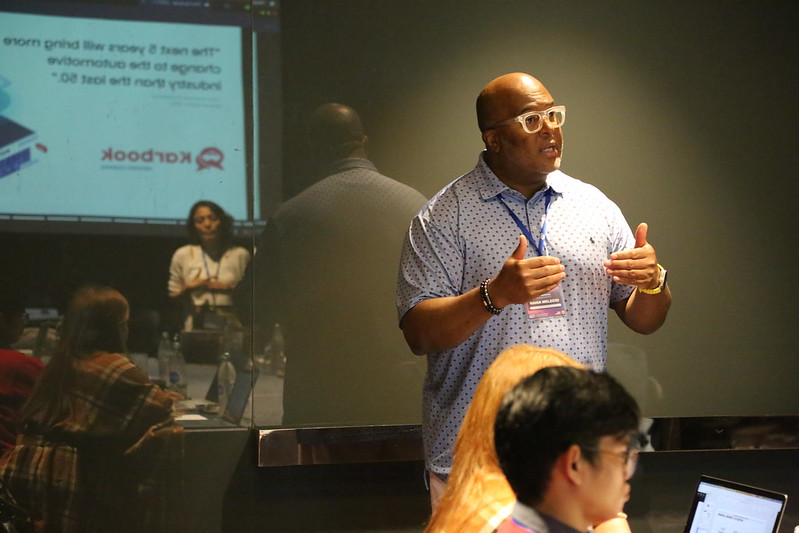
How will women innovators shape the future of global innovation?
Building New Models of Mutual Support in Bangkok
Tuesday brought together innovators and ecosystem builders for a second day of workshops and training sessions, built to enable these community members to thrive and build ventures and ecosystems that empower women at all scales and stages.
In the morning, gender expert Denisse Tiznado led innovators through a series of exercises oriented around women's issues and opportunities, from overcoming gender-based discrimination to inclusive leadership. This was a formative experience for all of the participants, giving them a safe space to share diverse perspectives and experiences to work together in building entrepreneurial models that protect and advance women in the startup sector. Emerging from this experience, innovator Nadea Nabilla described the shift in perspective: “I thought this would be very competitive but surprisingly we are kind of just like sisters. We are helping each other.”
Innovators in the afternoon had the opportunity to continue working with venture development experts Rhonda and Nakia, developing their pitches with feedback from the group and from the experts, giving them the opportunity to refine and perfect their strategies ahead of the big event!
Select Pacific GIST Innovation Hub leaders and ecosystem builders also had the opportunity to network, build connections, and gain key insights into the future of innovation in their region. Priscilla Kevin of PNG Digital Cluster, Papua New Guinea, and Ana Lidia Franzoni of EPIC LAB ITAM, Mexico, each were able to share their knowledge, perspective, and vision with the venture development experts, as well as build important connections and partnerships throughout the global Pacific.
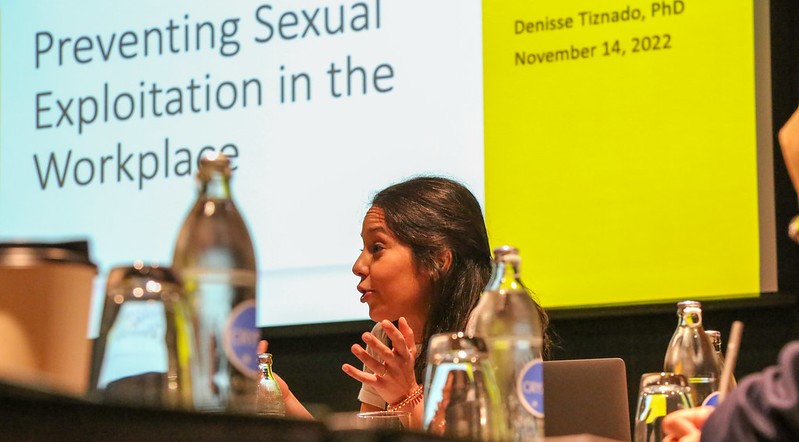
What does the future of innovation in Asia Pacific Look Like?
Women-Led Science and Technology Takes a Global Stage
The big day finally arrived on Wednesday as the best of Pacific innovation came to life in Bangkok. The sixteen finalists built on everything they had learned over the previous two days to deliver the pitches that would send them to the finals. Across two stages, the innovators shared their vision for tackling some of humanity's greatest challenges, from early Alzheimer's detection to carbon capture technology, childhood education to rural medical access. Despite the diversity of innovation, each innovator had something essential in common: each demonstrated the extraordinary potential, value, and vision of women-focused innovation, and the role that this innovation will play in solving global challenges now and in the years to come. And more, each demonstrated a new model for entrepreneurship in action: a model built on mutual support, connection and collaboration; that even in the face of competition, women innovators can build on one another and lift each other up. To an audience of their peers, select judges representing the best of Thailand's innovation ecosystem, and members of the local innovation community, these founders launched their pitches from a foundation built on that support.
Each innovator was extraordinary, and judging who would move on to the finals proved to be an almost impossible task for our esteemed judges who deliberated for over an hour, going into painstaking detail over which founder would move on to the next stage. After all of the effort and progress each of these founders put into their pitch development, it was not an easy task–each was already an incredible success in her own right. Ultimately, the judges were ready to announce their decision; the five finalists would include:
Trang Pham Thi Nhu of Brain Analytics, Vietnam
Pamela Barroso of Luyef, Chile
Nadea Nabilla of Azura Indonesia, Indonesia
Dr. Choe Peng Leo of ThinKers, Malaysia
Melissa Chavana of sinCarbono, Mexico
They each would have the opportunity to pitch again in the Finals event, to a new panel of expert judges who would have the equally difficult task of deciding the top places. But first, the entrepreneurs, industry experts, and entrepreneurial ecosystem had the opportunity to attend a catered luncheon and networking opportunity, as well as the chance to continue to refine their pitches before the big event.
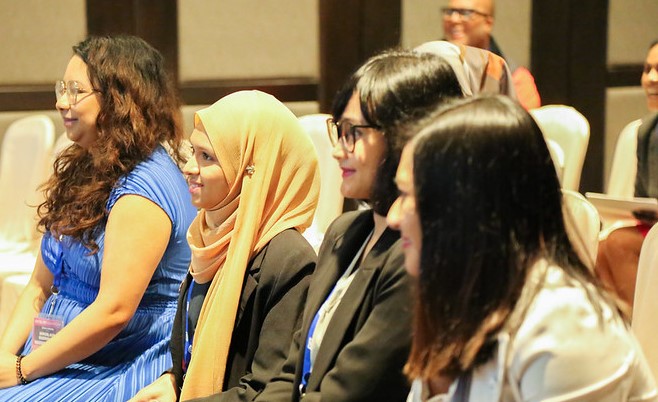
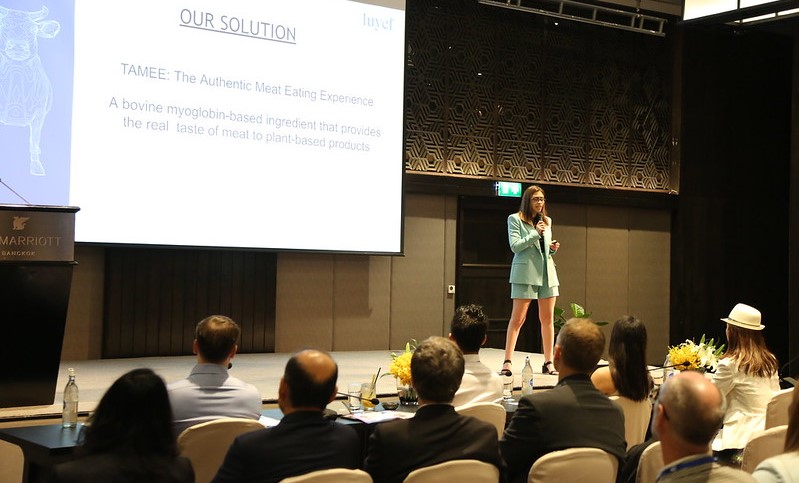
By the time evening arrived, there was an excited hum in the air as the audience began to fill the auditorium and the innovators were ready to take the stage once again. They were joined at the event by U.S. Government and Department of State leadership, including Assistant Secretary Ramin Toloui and Special Representative Dilawar Syed. This event was essential to fulfilling key priorities of the U.S. Department of State, the Bureau of Oceans, Environment and Science, and Office of Global Women’s Issues. Through highlighting the role women founders play in fostering science and technology innovation throughout the Global Pacific, the United States is taking seriously its responsibility to uplift and empower the next generation of global leadership and foster international collaboration and connection. To this end, Special Representative Syed described the key role women innovators play in fostering development at home and abroad, and to build on the spirit of this event moving forward, declared “Because you are trailblazers, pull others along. And the way to do that, especially in this case, is through mentorship, through being a role model, through leaning in and developing that community… You all will have an amazing impact.”
In his remarks, Assistant Secretary Toloui explained the importance of events such as CATALYST, proclaiming that “this event underscores how we need to look in places which are underrepresented if we want to find and tap into the solutions to the problems of the future. And women are underrepresented in our economies as a whole, they are underrepresented in science and technology fields, and they are underrepresented in venture capital. One important purpose of this event, which the U.S. government is very proud to be a sponsor of and be associated with, is to provide a platform to elevate the innovative work the women of the Asia Pacific APEC region are doing…We are committed in the State Department and the U.S. government to provide opportunities to shine a spotlight on innovation. That’s important not only for achieving the very important goal of inclusivity but it's also important to provide solutions to the critical problems facing the world.”
The five extraordinary finalists pitched innovations that would work to do exactly that, each one working to solve a key global challenge. The power of the pitches did not make this round of judging any easier for the experts, who worked to deliver the winning order. After a challenging deliberation, the winners were announced!
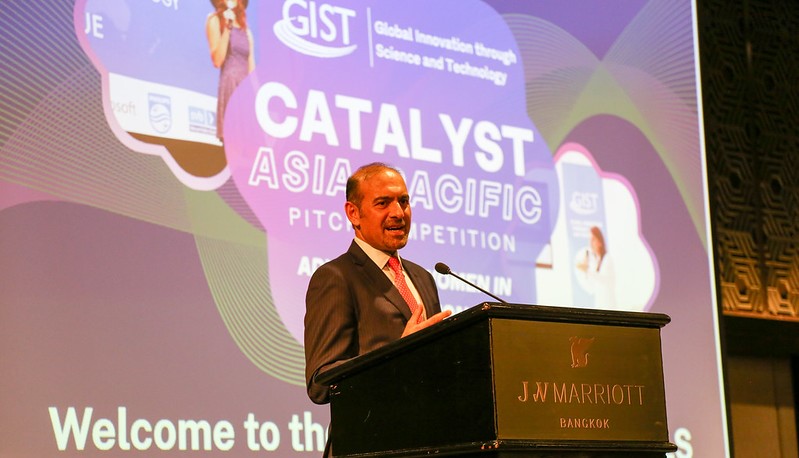
In fifth place winning $7000 was Pamela Barroso (Chile) with Luyef Biotechnologies, a mission-driven B2B food tech startup developing unique technology to fully replicate the sensory profile of conventional meat into alternative meat products (plant-based and cultivated meat) to work towards achieving the mission of accelerating the transition toward a more sustainable and animal-free food industry.
In fourth place winning $8000 was Nadea Nabilla of Azura Indonesia, a social enterprise that provides an electric propulsion system for small boats called MantaOne–an innovation that, when users shift from a combustion engine to it, reduces their running cost and carbon footprint by approximately 70%.
In third place winning $10,000 was Trang Pham Thi Nhu (Vietnam) of Brain Analytics, developer of a software to detect Alzheimer's disease early and accurately. It applies ensemble learning using traditional machine learning and deep neural networks to analyze MRI brain images.
In second place, being awarded $20,000, was Melissa Chavana (Mexico) of sinCarbono, a software that simplifies carbon footprint reduction of SMEs through measuring, reporting, verifying, offsetting and financing eco-technologies. It generates a sharable digital report that monitors reduction targets and gives the opportunity to offset emissions through a forest conservation project in Mexico, as well as offering a catalog of customized energy efficiency measures.
And finally, the grand prize winner was announced–for a winning total of $25,000, Dr. Choe Peng Leo (Malaysia) of ThinKers won 1st place. Her innovation is on the leading edge, focusing on thin film solutions for carbon capture, water recovery and food purification. Her first generation solution, the Carbon+ membrane, allows absorbed carbon dioxide to react with calcium-rich waste to form carbonates in a carbon capture technology, which was then built towards her second generation solution, Carbon+ fertilizer, which contains carbonates that absorb nutrients in wastewater for soil fertilizing.
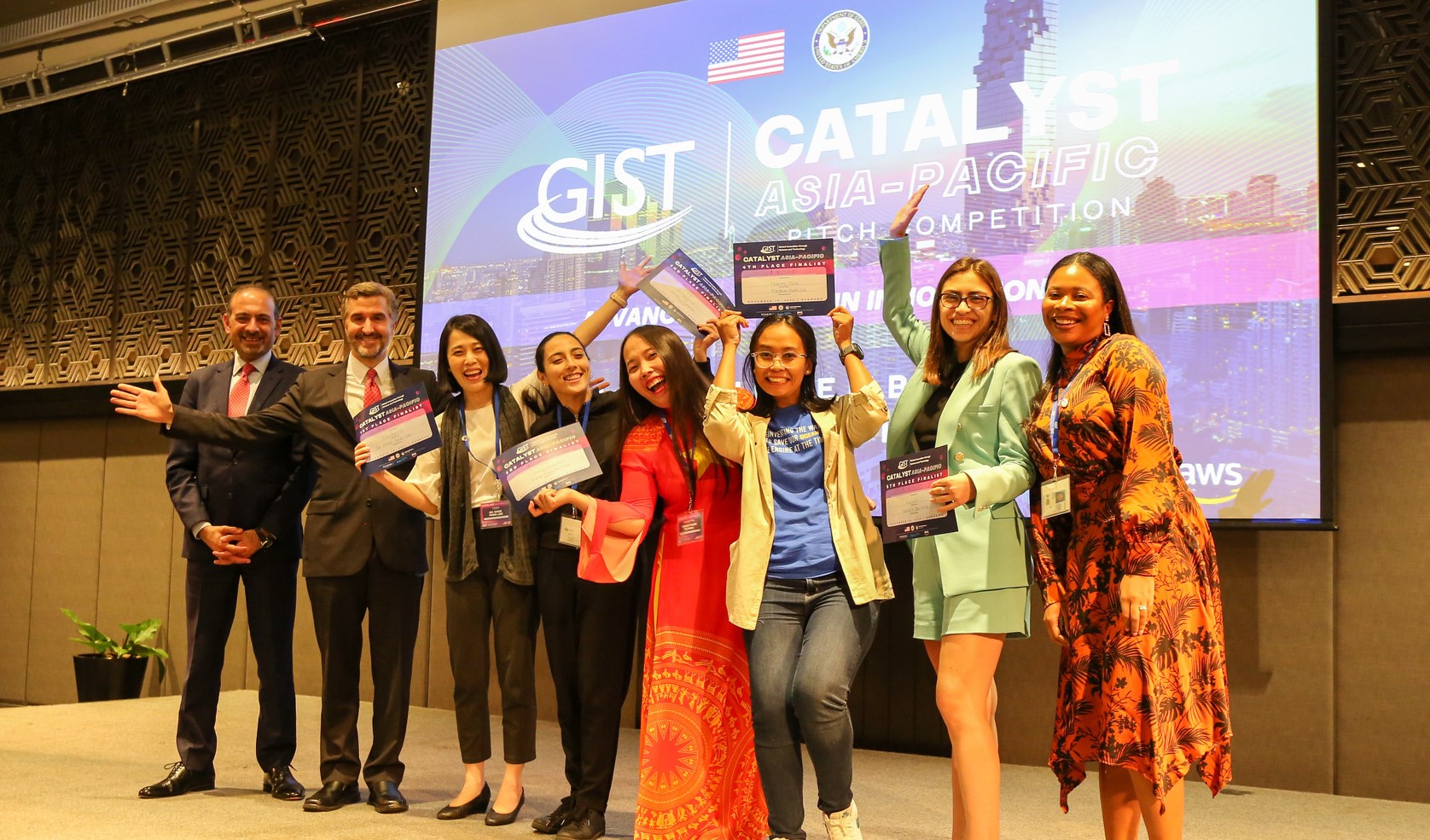
Capping off the experience was a reception and networking opportunity where innovators had the chance to get to meet the judges and experts on a more equal level, as well as celebrate all that they had accomplished in this journey so far. The event was also host to a panel of the expert judges, moderated by venture development expert Rhonda Shrader, that discussed the present and future of innovation throughout the Global Pacific. This gave the entrepreneurs and attending innovation ecosystem members one more opportunity to learn from these industry leaders and gain the confidence and knowledge to continue to work towards solving, building, and innovating at the forefront for women innovators around the globe. The GIST Initiative is proud to continue to be a part of this effort; join us as we work to build a better future for global innovation.
Learn more about the CATALYST Program, and sign up for our newsletter for the latest opportunities- perhaps your venture will be next to take the global stage!